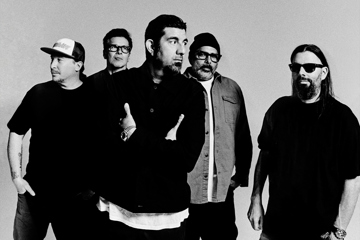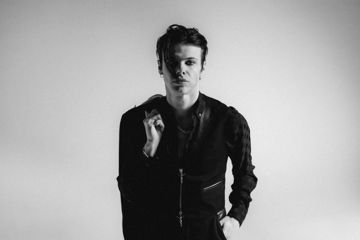Kraftwerk: Power Up.

Machines Of Love & Grace.

Kraftwerk play the Big Day Out at the Gold Coast Parklands on January 19.
When it comes to the forefathers of techno, hip-hop and associated music there is no more definitive band than Kraftwerk.
Core duo and classical music students, Florian Schneider and Ralf Hutter originally met at the Dusseldorf Conservatory where they teamed up in the band Organisation which issued one album, Tone Float. By the end of 1970 they had disbanded Organisation and rechristened themselves Kraftwerk (German for power plant). The original line-up included Klaus Dinger and Thomas Homann who split after the first self-titled Kraftwerk (aka Highrail) album to form the equally legendary and influential Neu!. Multi-instrumentalist Michael Rother joined briefly in 1971 and worked on Kraftwerk 2 before he left to depose Homann and form the core of Neu! with Dinger.
The first three Kraftwerk albums, frankly, aren't essential except other than as historical artifacts that are most notable for their minimalism and the beginnings of the trademark Kraftwerk sound - hypnotic, repetitive, rhythmic construction. The third, Ralf & Florian (1973) is the most important because it mark's Hutter and Schneider's initial movement towards melody and, by extension, dance music.
Autobahn (1974) is a stone cold masterpiece and one of the most important records in the history of 20th Century music. It resonates through and foreshadows virtually every new development to impact on the contemporary pop scene since its release in 1974. Kraftwerk's hypnotic electro-pulse is defined right here. It would echo through time. The 22-minute title track encapsulates everything that is important and vital about Kraftwerk and defines why they became important, but the rest of the soundscapes and songs are just as good. Electro-funk, ambient and synth-pop were born with Autobahn. If you don't own it, your record collection is incomplete.
Radio-Activity (1975), by comparison, was somewhat of a let down. That said this concept album which deals with broadcast communication marks a surprising shift to exploring the sound of electricity, static, noise, even - like John Cage - silence. Most notable is the electro-pop title-track, the first-ever Kraftwerk song to be performed in English. And in The Voice Of Energy there is the first strong hint of the robot voice that would become a definitive and integral part of their work in the future.
Trans-Europe Express (1977) was not only a return to form but has been often called the definitive Kraftwerk album. Like Autobahn it is mandatory part of any serious collection. A journey through a dehumanised global village, Trans-Europe Express is probably their most accessible album and their most musically complete. The motion and rhythm of the title track - a brother to Autobahn - is matched by the irresistible melodies that litter the other six tracks. Samplers have been hot on it for years, in the case of Afrika Bambaataa too hot: his highly influential dancefloor smash Planet Rock ended up wearing a lawsuit. Trans-Europe Express remains a timeless work and one of the true heartlands of electro-pop.
The Man Machine (1978) - bring on the robots, baby. And that's just what Ralf and Florian did. The machine-as-master concept that lay at the foundation of its predecessors was opened up completely while the only track to refer to a human, The Model, became a #1 single in the UK – and one of the most hummable of all time. Gary Numan and the New Romantics took The Man Machine to heart and used it as the catalyst to many of their creations. The electronically-processed vocals of the opening The Robots, Spacelab and the title track are definitive moments in the genre. The last great Kraftwerk album.
Computer World (1981) remains a favourite of many Kraftwerk fans, but it is also the first of three albums that were separated from its predecessor by ever increasing periods of time. Conceptually, it's all about a world dominated by technology, as is the album. Perhaps, a little too much so. Kraftwerk's greatest skill was always their ability to make technology warm, emotional, even cuddly. Here it becomes colder, more distant; the chip takes over. Unlike The Model or the dramatically edited version of Autobahn, its poppy single Pocket Calculator doesn't wear that well. Like the technology it celebrates it's fun but almost outdated. A curio then doesn't come up as well as some of its predecessors but is still worth reacquainting yourself with.
Electric Cafe (1986) marked the band's return after a five-year absence and now seems little more than a rather tame response to disco music. At 36 minutes, it's a short, uninspired, mainstream meander with few new ideas and little to recommend it, other than the fact it is Kraftwerk.
Kraftwerk remain one of the most influential bands of all-time, and the release of a new single, Expo 2000, in late 1999 was greeted with the kind of mania reserved for anything from only the most legendary of acts. And while Hutter and Schneider take most of the glory, their compatriots over the years, Emil Schult - who masterminded the group's change of image into a blend of Germanic romanticism and formal, stark modesty, Wolfgang Flur, Klaus Roeder and Karl Bartos, must also be mentioned. These were theoriginal men and their machines.







